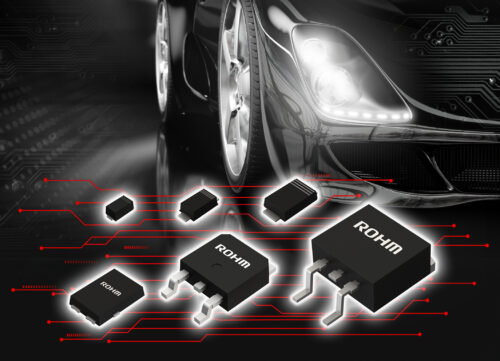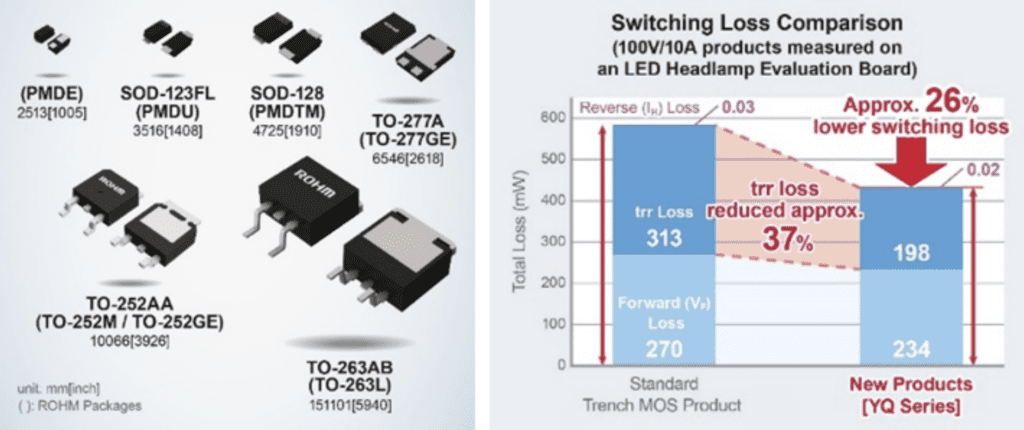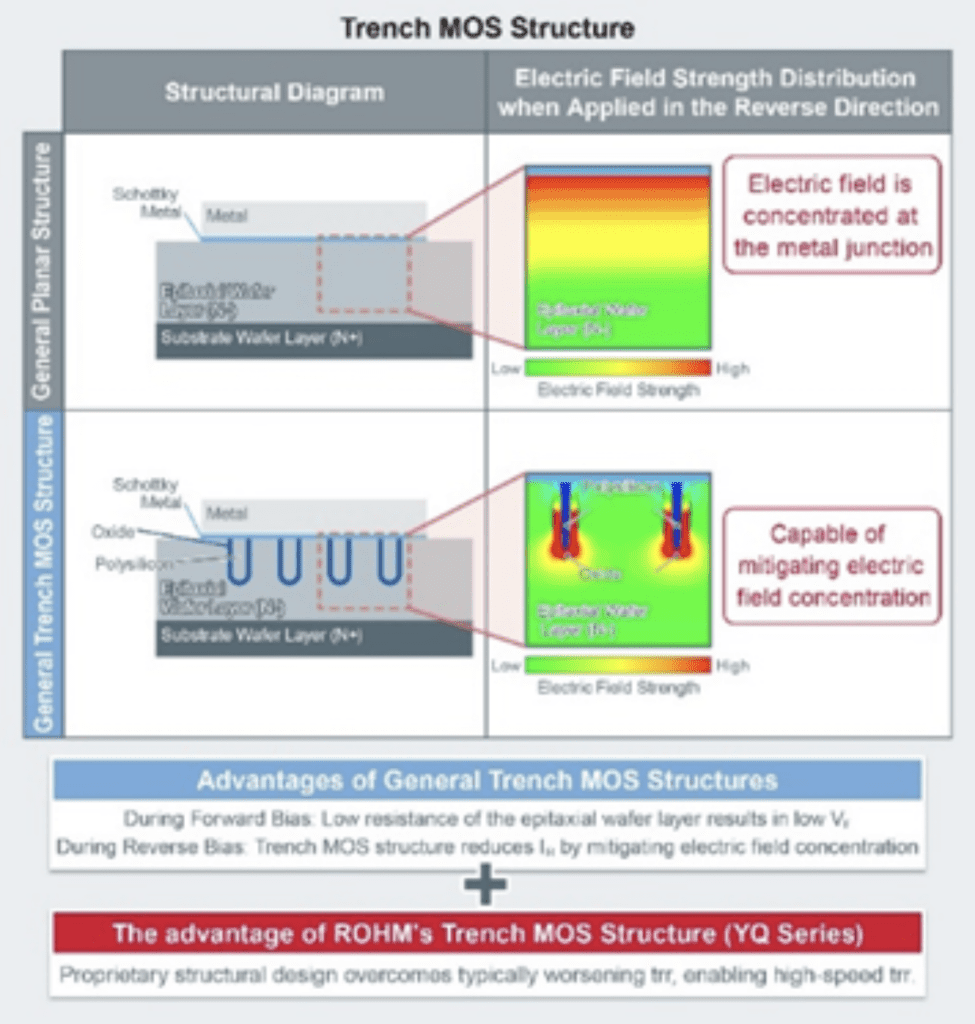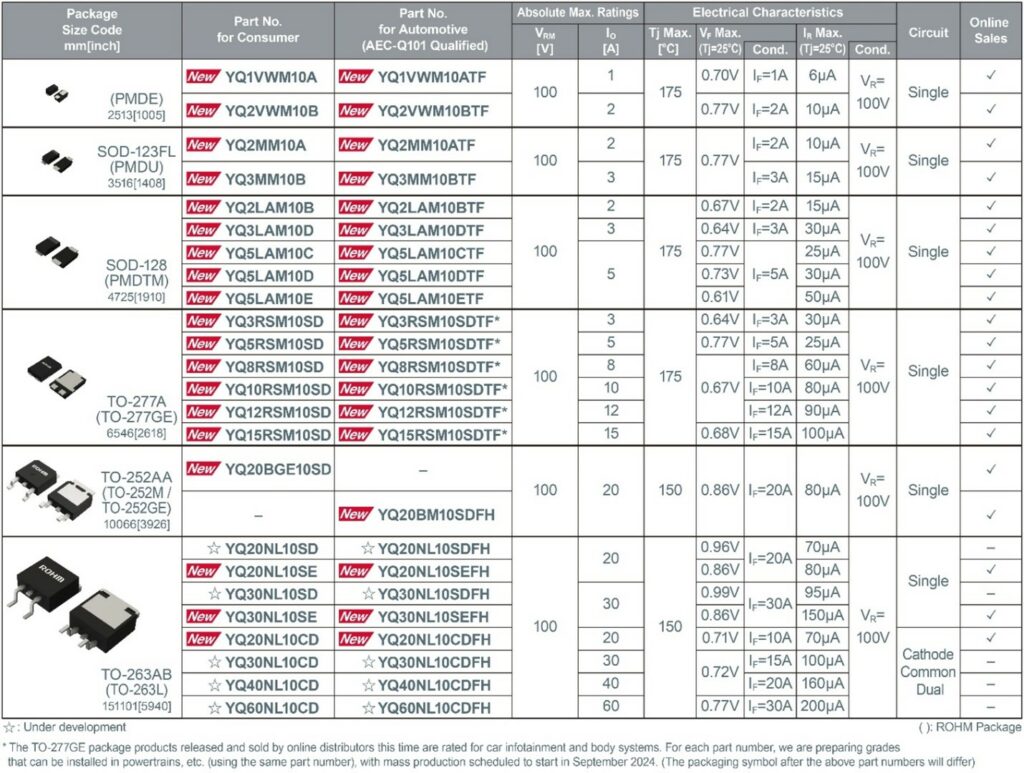Ideal for automotive LED headlamps and other high-speed switching applications.
ROHM Semiconductor today announced new 100V breakdown Schottky Barrier Diodes (SBDs) that deliver industry-leading reverse recovery time (trr) for power supply and protection circuits in automotive, industrial, and consumer applications.
Although numerous types of diodes exist, highly efficient SBDs are increasingly being used in a variety of applications. SBDs with a trench MOS structure provide lower VF than planar types and enable higher efficiency in rectification applications. One drawback of trench MOS structures, however, is that they typically feature worse trr than planar topologies, resulting in higher power loss when used for switching.
In response, ROHM developed a new series of SBDs utilizing a proprietary trench MOS structure that simultaneously reduces both VF and IR (which are in a trade-off relationship) while also achieving class-leading trr.
Expanding on the four existing conventional SBD lineups optimized for a variety of requirements, the YQ series is ROHM’s first to adopt a trench MOS structure. The proprietary design achieves class-leading trr of 15ns that reduces trr loss by approximately 37% and overall switching loss by approximately 26% over general trench-type MOS products, contributing to lower application power consumption. The new structure also improves both VF and IR loss compared to conventional planar type SBDs. This results in lower power loss when used in forward bias applications such as rectification, while also providing less risk of thermal runaway which is a major concern with SBDs. As such, they are ideal for sets requiring high-speed switching, such as drive circuits for automotive LED headlamps and DC-DC converters in xEVs that are prone to generate heat.
Going forward, ROHM will strive to further improve the quality of its semiconductor devices, from low to high voltages, while strengthening its expansive lineup to further reduce power consumption and achieve greater miniaturization.
SBD Trench MOS Structure
The trench MOS structure is created by forming a trench using polysilicon in the epitaxial wafer layer to mitigate electric field concentration. This reduces the resistance of the epitaxial wafer layer, achieving lower VF when applying voltage in the forward direction. At the same time, during reverse bias the electric field concentration is minimized, significantly decreasing IR. As a result, the YQ series improves VF and IR by approximately 7% and 82%, respectively, compared to conventional products.
Unlike with typical trench MOS structures where trr is worse than planar types due to larger parasitic capacitance (resistance component in the device), the YQ series achieves an industry-leading trr of 15ns by adopting a unique structural design. This allows switching losses to be reduced by approximately 26%, contributing to lower application power consumption.
Application Examples
- Automotive LED headlamps
- xEV DC-DC converters
- Power supplies for industrial equipment
- Lighting
Product Lineup
Product Page and Related Information
Application notes highlighting the advantages of these products in circuits, along with a white paper that highlights the features of each SBD series, are available on ROHM’s website. An SBD page is also available that allows users to narrow down product options by entering voltage conditions and other parameters, facilitating the selection process during design.
- ROHM SBD Product Page: https://www.rohm.com/products/diodes/schottky-barrier-diodes
- Application Note: Advantages of YQ Series: Compact and Highly Power Conversion Efficiency Schottky Barrier Diodes for Automotive
https://fscdn.rohm.com/en/products/databook/applinote/discrete/diodes/yq_sbd_automotive_an-e.pdf - White Paper: ROHM’s SBD Lineup Contributes to Greater Miniaturization and Lower Loss in Automotive, Industrial, and Consumer Equipment
https://fscdn.rohm.com/en/products/databook/white_paper/discrete/diodes/sbd_lineup_wp-e.pdf














